The Roborock Q7 Max vs S7 MaxV are higher-end options with many bells and whistles from the Chinese brand. But after all, which option is better? The S7 MaxV has my winning ticket!
These Roborock robots are pretty close in terms of cleaning performance and share many punches from the brand, such as an upgraded bristle-less roller, a large battery, LIDAR navigation technology, the ability to memorize up to 4 maps, and more. But the Roborock S7 MaxV has some additional smart features on the app and features a liftable mop to prevent damping your carpets. Of course, it comes with a higher price tag compared to the Roborock Q7 Max.
Roborock Q7 Max Vs S7 MaxV: Comparison Chart




Roborock Q7 Max Vs S7 MaxV: Differences
The S7 MaxV dominates with a 5-1 win against the Q7 Max. Explore my comprehensive comparison of these two beasts!
Cleaning Performance
Winner: Roborock S7 MaxV
Hard Floor
| Roborock Q7 Max | Roborock S7 MaxV |
|---|---|
| ≈ 97% | ≈ 98% |
My tests showed these bots were the bee’s knees regarding cleaning hard floors. The S7 MaxV picked up slightly more, but the marginal difference between them makes it a near-impossible task to decide which one is better.
Carpet
| Roborock Q7 Max | Roborock S7 MaxV | |
|---|---|---|
| Low-pile Carpet | ≈ 94% | ≈ 97% |
| High-pile Carpet | ≈ 95% | ≈ 96% |
I also tested them on my low- and high-pile carpets to see how well they performed on these types of surfaces, and both did a sublime job. The S7 MaxV, again, proved to be the superior choice, showcasing higher debris pickup percentages on both carpet types.
Hair
| Roborock Q7 Max | Roborock S7 MaxV | |
|---|---|---|
| 5-inch Strands | ≈ 87% | ≈ 74% |
| 10-inch Strands | ≈ 61% | ≈ 68% |
While the Q7 Max excelled in collecting more 5-inch strands, the S7 MaxV prevailed in retrieving more 10-inch strands. One big plus with their bristle-less rollers is that there wasn’t much hair wrapping on them, not to mention that untangling them was a breeze without scissors.
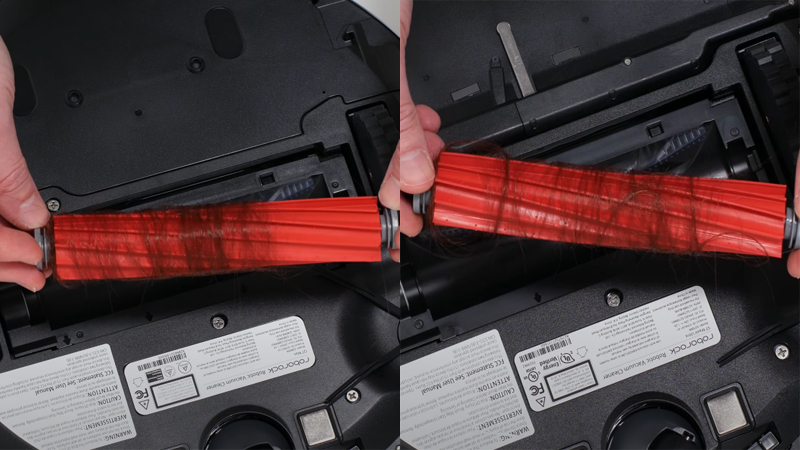
Design & Usability
Winner: Roborock S7 MaxV
Dimensions & Weight
| Roborock Q7 Max | Roborock S7 MaxV | |
|---|---|---|
| Dimensions (W x H) | 13.8 x 3.8 inches | 13.9 x 3.8 inches |
| Weight | 8.38 lbs | 10.36 lbs |
Both the Q7 Max and S7 MaxV are similar in dimensions, with a puck-shaped frame that is the most common shape among robot vacuums. I’ve tested some D-shaped ones, such as the Roomba S9 or Neato D10, which clean quicker due to a wider main brush and showcase proficiency in corner cleaning. However, the circular shape excels in maneuverability and is adept at getting out of tight spaces.
Due to the absence of a self-cleaning base, they are fairly space-efficient. Both are also a bit taller than iRobot Roombas due to a LiDAR laser tower on top, but they were still able to traverse under most pieces of my furniture without any hassles.
Extractor & Side Brush
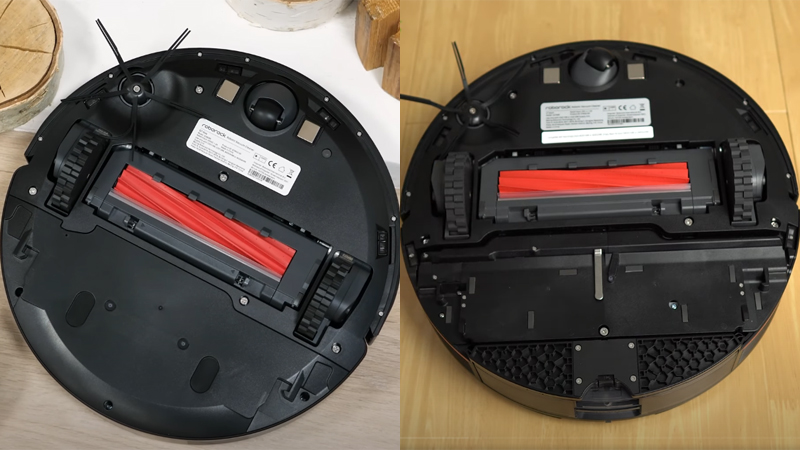
Another similarity shared between the Q7 Max and the S7 MaxV is their primary brush rollers and spinning side brushes. Like all newer models from Roborock, they feature a single bristle-free rubber roller, reputed for superior debris pick-up, which, in my opinion, stands out as one of their predominant advantages.
Roborock proclaims these silicone brush rolls as “strongly resisting hair tangles.” In my view, this seemed a bit overstated, as I noticed a considerable amount of hair did become entangled during my tests. However, cleaning them was more notably straightforward than untangling traditional brush bars with bristles.
To catch dust from corners and edges, both use a single, all-rubber side brush, which offers better longevity than its bristled counterpart. It is prone to tangling, necessitating regular cleaning, particularly for those residing with furry friends. Fortunately, it can be easily detached from underneath the chassis with a screwdriver.
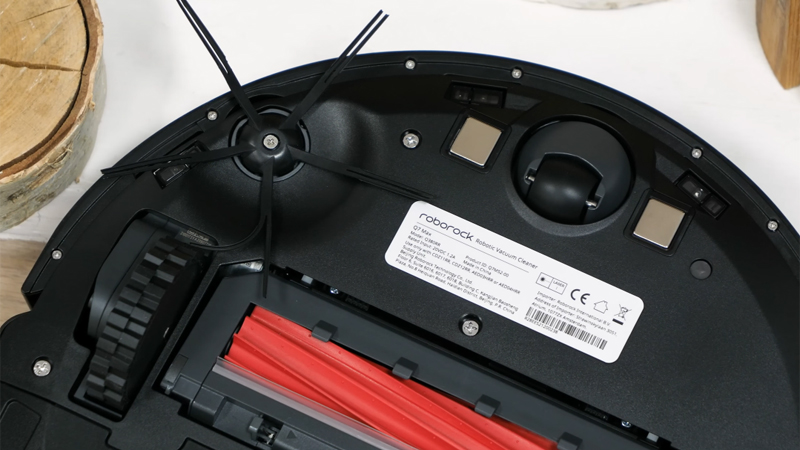
Navigation
These robots use the same LIDAR laser-based technology for swift and precise mapping and navigation. They also allow you to save up to 4 floor layouts, so they don’t need to constantly re-map every time they are brought to another floor.
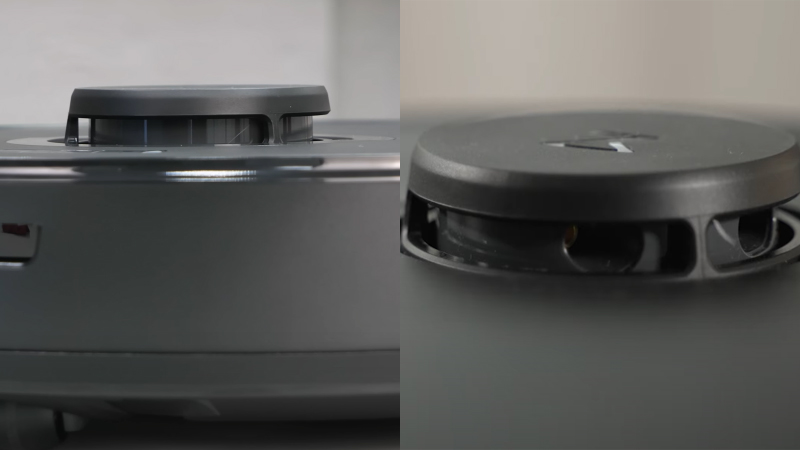
Thanks to the 360-scanning capability of their LIDAR turrets, these bots can indeed substantially cut down on time spent during the mapping process compared to vSLAM-based robots, which necessitate multiple traditional vacuuming cycles. These Roborocks can operate effectively even in dimly lit or dark environments – this is in stark contrast to vSLAM visible-based robots, which necessitate sufficient illumination to do their jobs.
But here is the main difference between them: the S7 MaxV can recognize and avoid common household objects via an RGB camera and a 3D scanner on the front – this is really a game changer for pet owners or parents!
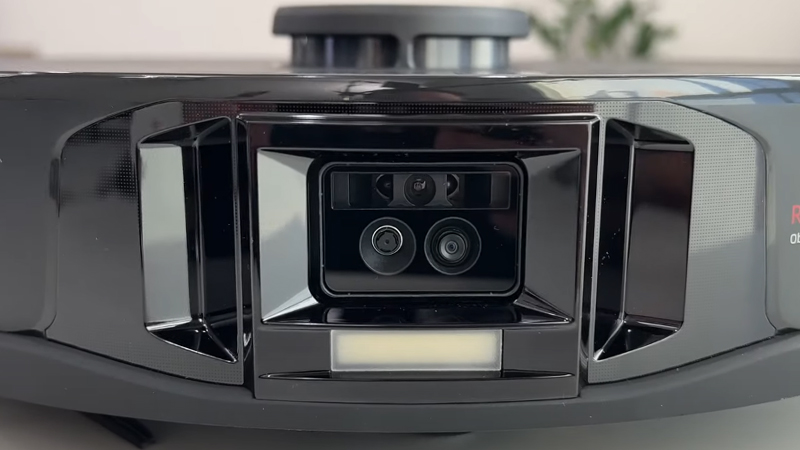
Throughout my testing, the S7 MaxV could recognize and completely avoid the most common household objects, including a can, a fake poop, a mug, and a shoe. Still, there was a fault: it couldn’t recognize my cable and just pushed it forward rather than avoiding it like Roborock’s premium models, such as the S8 Ultra.
Battery Life
| Roborock Q7 Max | Roborock S7 MaxV | |
|---|---|---|
| Battery Life | ≈ 91-183 mins | ≈ 92–190 mins |
| Charging Time | ≈ 198 mins | ≈ 180 mins |
Both the Q7 Max and S7 MaxV come equipped with a large 5200 mAh lithium battery, which is the most powerful battery and allows these robots to clean most households on one charge. What’s more, they are built with a “Recharge & Resume” function, allowing them to autonomously return to the docking station to refuel their batteries and resume cleaning, ensuring every nook and cranny is addressed, even if it requires more than one session.
Control
Winner: Roborock S7 MaxV
Manual Control
Both the Q7 Max and S7 MaxV have an amazingly wide array of cool features, but most of them are accessed via the Roborock app. But if you just want to start or stop a cleaning cycle, you can just press the “Clean” button on the chassis of these Roborocks instead of taking out your phone. Each also has a “Dock/Home” button, allowing for easy return to their base stations, and a “Spot Clean” button to direct these vacuums to clean a small zone around themselves.
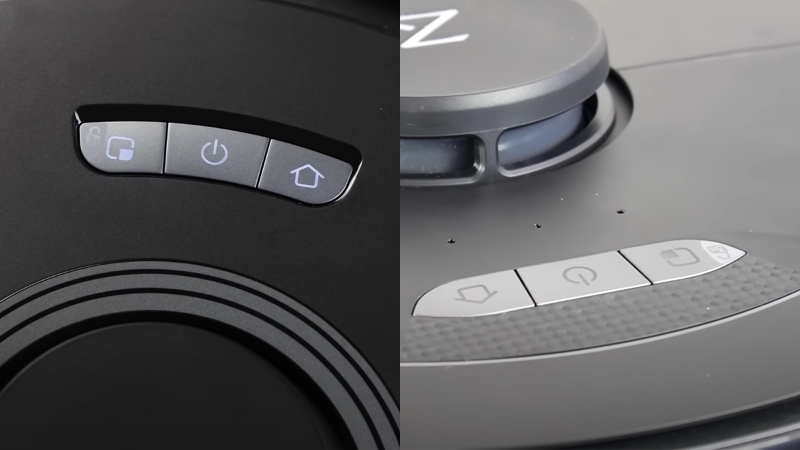
App Connectivity
Both the Q7 Max and S7 MaxV can connect to your phone via the Roborock app to unlock all their smart features and get the most out of them. They largely share the same functionalities, with the exception of a few additional features that give the S7 MaxV an advantage.
Let’s start with the similarities. Both allow you to divide the map into rooms and name them. Then, you can clean individual rooms and schedule cleanings for automatic operation. You can also start/end a cleaning trip or send your bot to clean a certain room by voice if you own a smart home assistant like Alexa or Google Assistant.
Both have a live map function as well, showing the location of the robot in real time. They also show the map in 3D form, giving you various angles of your living space map. You do have the capability to include furniture, but this is more of an aesthetic touch than a practical feature.
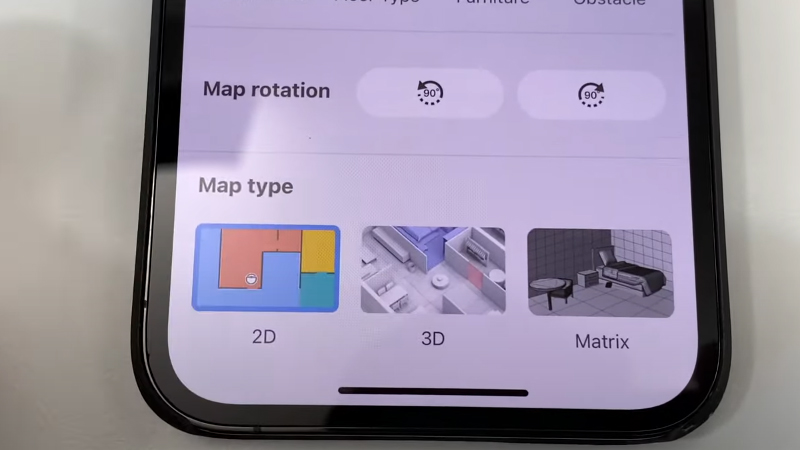
To prevent these bots from entering certain areas of your home, such as your little ones’ room, you can draw “no-go block zones” or “virtual walls” with ease. Likewise, you have the option to set “no-mo zones” to prevent these bots from mopping carpeted areas. There is a maintenance tab that displays the condition of different components and indicates when maintenance or replacement is necessary.
Speaking of the differences, only the S7 MaxV has a scrub intensity function with three levels since this one has the vibrating element (more on that later). Additionally, its front-facing camera can double as a moveable CCTV camera, allowing you to view its real-time perspective – this comes in handy in some scenarios, for instance, when there’s an object on the floor that you want to look more closely.
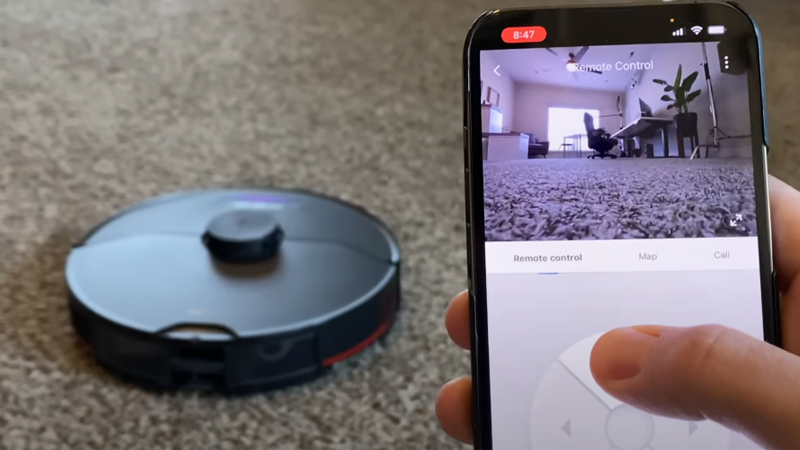
Cleaning & Maintenance
Winner: Tie
The Q7 Max features a hybrid dirt bin that holds up to 0.47 liters of trash, and it’s the only Roborock with this space saver. Meanwhile, the S7 MaxV uses a separate 0.4-liter duts bin. Their bins are on the small side and demand manual emptying due to the absence of self-emptying mechanisms or base stations. They come with E11 filters to keep dirt and allergens inside their bin – and these filters are washable, meaning you don’t need to be worried about replacing them with new ones all the time.
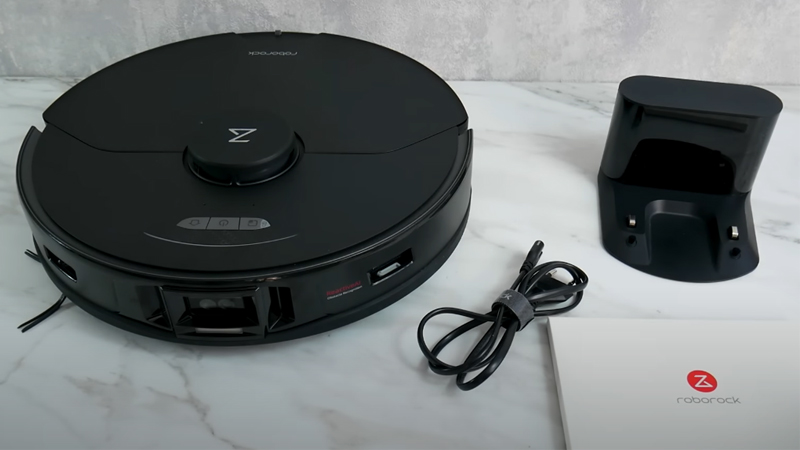
If you prefer a hands-off, low-maintenance approach, it’s a smart move to invest in the Q7 Max+ or S7 MaxV Ultra since they come with clean bases. After completing a cleaning cycle or when their dust bins are full, they automatically return to the base station and transfer all the debris from their bins to a larger, sealed dust bag in the base station. The whole emptying process is sealed, helping to prevent the escape of dust and allergens back into the air.
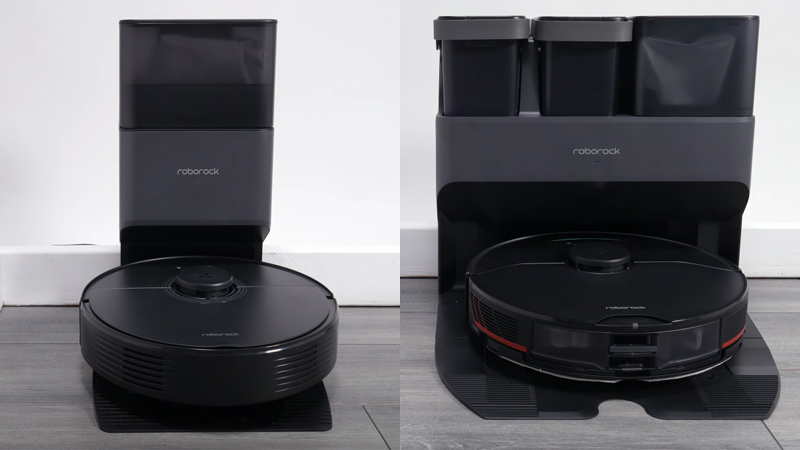
Other Features
Winner: Roborock S7 MaxV
Noise
| Roborock Q7 Max | Roborock S7 MaxV | |
|---|---|---|
| Working | ≈ 59-75 dB | ≈ 59-71 dB |
| Self-Emptying | None | None |
I noted that these robots only exhibit somewhat high noise levels when in maximum suction mode. Fortunately, this is not a frequently used setting, not to mention that their noise level isn’t much of an issue unless you schedule cleaning in the middle of the night.
Mopping Ability
Both the Q7 Max and S7 MaxV are vac-and-mop robots, meaning they can vacuum and mop at once, but they don’t really work the same. I mean, yes, both are still equipped with a built-in water tank and a hemispherical-shaped mop pad, but the S7 MaxV takes the lead with a liftable mop called VibraRise technology and a Sonic scrubbing system, making it better than any other hybrid robot I’ve touched.
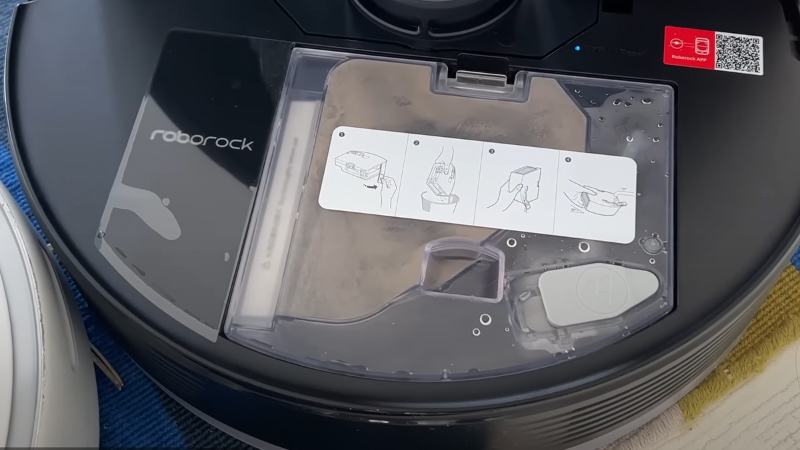
The S7 MaxV is fitted with VibraRise technology, allowing it to intelligently detect carpets and elevate its mopping pad 5 mm above the floor, ensuring the mop doesn’t make contact with the carpet. But it doesn’t work with high-pile carpets so you still need to create “no-mop zones” via the app to restrict the robot from mopping these areas. Its ability to detect and display carpets on the app facilitates easy identification of areas where no-mop zones should be assigned.
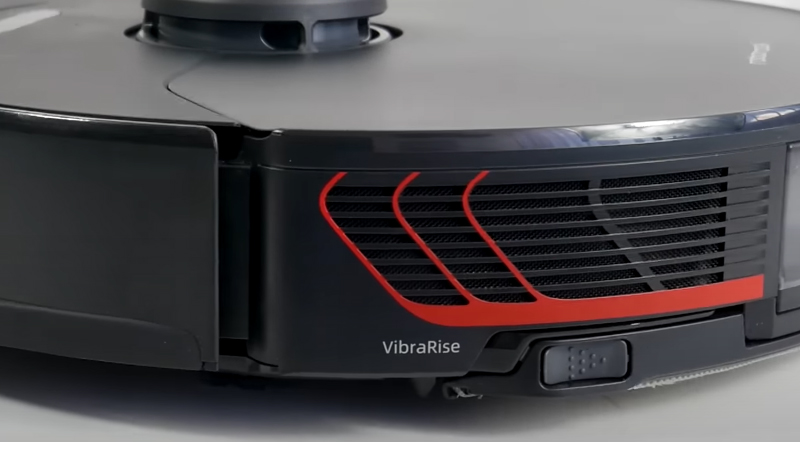
The best part about the mopping system on the S7 MaxV is the ability of its mopping plate to vibrate, ensuring more in-depth cleaning with three scrubbing intensities: low (1650 vibrations per minute), medium (2300 vibrations per minute), and high (3000 vibrations per minute). On the other hand, the Q7 Max only has a normal mop plate, so it is not as effective.
One notable limitation of these Roborocks is their inability to handle liquid pick-up. So deploying them to clean substantial food-related messes is not advised since they might leave an undesirable sticky residue in their wake.
Quick Rundown Of Roborock S7 MaxV
- ReactiveAI 2.0. With Roborock’s next generation of obstacle avoidance technology, ReactiveAI 2.0, S7 MaxV can navigate around common domestic hazards using its RGB camera and a new neural processing unit. An additional light turns on in dark rooms, making obstacle recognition as effective at night as during the day. 3D structured light systems supplement the RGB camera and can spot unknown objects, determine their size and location, and allow the robot to navigate around them.
- Next-Level Intelligence. Using its camera, S7 MaxV can now recognize the furniture in your home and place them on the map automatically. It can also identify your floors in each room and recommend cleaning patterns and scrub intensity accordingly.
- The Most Powerful Roborock Robot Vacuum Ever. S7 MaxV has more suction power than any previous Roborock robot vacuum, generating a maximum of 5100 Pa. That’s more than double the power of S6 MaxV. It quickly picks up debris, hair, dust, and more from hard floors and carpets.
Quick Rundown Of Roborock Q7 Max
- Deeper Cleaning with Powerful 4,200 Pa Suction: With 4,200 Pa maximum suction, the Q7 Max effortlessly lifts debris and pet hair from floors, drags dirt from cracks, and deep-cleans carpets; it automatically boosts suction when carpets are detected, ensuring thorough cleaning
- Vacuum and Mop Simultaneously: To eliminate fine dust that vacuuming alone might miss, this robot vacuum can vacuum and mop in one go; its electronic pump offers 30 adjustable water flow levels, allowing you to customize cleaning based on floor type and preference
- Clean Smarter with PreciSense LiDAR Navigation: Highly accurate LiDAR technology builds precise 3D maps of your home and identifies the most efficient cleaning routes; virtually recreate your space by adding furnishings and flooring materials for a more tailored cleaning experience
- Combined Dustbin & Water Tank: The 470 ml dustbin and 350 ml water tank combination supports longer cleaning sessions without the need for frequent emptying or refilling
- Effortless Cleaning with All-Rubber Brush: The all-rubber brush is specifically designed to resist tangles from long hair and pet hair; its multi-directional floating design maintains close contact with the floor, ensuring deeper and more efficient cleaning
Product Videos
Related Articles to Roborock S7 Maxv
- Roborock Q Revo Vs S7 MaxV: Which Roborock Takes The Lead?
- Roborock S7 MaxV Vs iRobot S9: A Head-To-Head Comparison
Related Articles to Roborock Q7 Max
- Roborock Q5+ Vs Q7 Max: Which Roborock Robot Should You Choose?
- An In-Depth Review Of The Roborock Q7 Max Vs Dreame L10 Pro: Which is Better?
- Roborock Q7 Max Vs S7: What Are the Differences Between Them?
- Roborock Q5 Vs Q7 Max: An In-Depth Analysis
- Roborock Q7 Max Vs Xiaomi S10T: A Detailed Comparison
- Roborock Q7 Max Vs Eufy X8: What Is The Best Option For Your Home?
- Viomi S9 Vs Roborock Q7 Max: Battle of the Feature-Rich Bots
- Viomi V5 Pro Vs Roborock Q7 Max: Which One Gets My Winning Ticket?
- Roborock Q7 Max Vs Dreame Z10 Pro: A Detailed Face-Off Comparison
- Roborock Q Revo Vs Q7 Max: Duel of the Roborock Dust-Suckers
- Dreame D10 Plus Vs Roborock Q7 Max: An In-Depth Comparison And Review
- Roborock Q7 Max Vs Q7: What Does The “Max” Label Refer To?
- Dreame D9 Max Vs Roborock Q7 Max: Which Chinese Brand Does the Job Better?
- Roborock Q7 Max Vs Q7 Max Plus: Is the Self-Cleaning Base A Game Changer?
- Roborock Q7 Max Vs iRobot J7: A Head-To-Head Comparison
References:
- Roborock S7 MaxV: https://us.roborock.com/pages/roborock-s7-maxv
- Roborock Q7 Max: https://us.roborock.com/products/roborock-q7-max

Richard B. Schmidt is a prominent figure in the vacuum cleaner industry, boasting over 15 years of expertise. Armed with a Robotics Engineering degree from Northeastern University and a Master’s in Consumer Science from Harvard, his unique blend of technical knowledge and consumer insights positions him as a sought-after authority in vacuum cleaner evaluation. Richard’s career began at Dyson, where he contributed to the development of innovative vacuum models. Transitioning to advocacy and reviews, he co-founded the first Vacuum-focused blog in 2008, offering comprehensive analysis and user guides for various vacuum cleaners. In 2020, he founded RoboMop.net, providing ongoing insights through columns and buyer’s guides.
